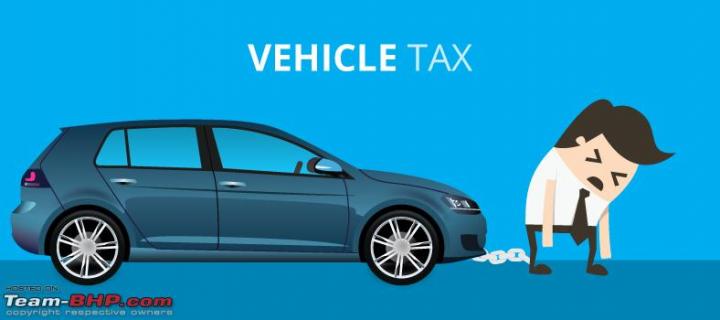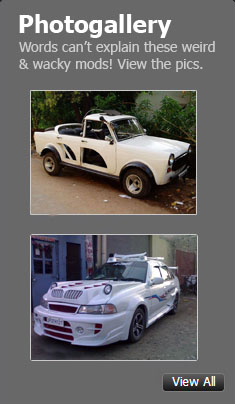News
What you pay to the government for owning a car in India
Even after paying all of these taxes, we still can't breathe easily.
BHPian inner_roadster recently shared this with other enthusiasts.
Despite soaring levels of congestion, declining levels of courtesy, rising fuel prices , we always find a reason to take out our car. This is what every car enthusiast looks for. But still I wondered about the financial load that comes with owning car in India. If you own a car, the government makes sure there shouldn't be any space for you to be exempt from paying taxes.
So when you decide to purchase a new car the process of taxation start.

So, now that you're ready to buy a new car and are aware of all the costs that are involved:
- Down payment
- Monthly EMI
- RTO Registration cost
- Insurance cost
The tentative estimate of actual cost of a car priced about 8 lakh will be as follows:

Thing does not end here, now you need to pay the tax for running your car. On refuelling the central and state governments levy taxes on fuel. The tax includes 55% of the overall on petrol and 50% on the diesel of the entire retail price. The petrol and diesel taxes vary from state to state as different states levy different Value Added Tax (VAT) and sales tax.
In states such as WB, the cost of a litre of petrol is
- Base Price of Petrol : 47
- Sum of all tax (ST/ Central): 57
- Cost of petrol we pay (Rs.) : 104
Even after paying all of these taxes, we still can't breathe easily. You have to now enjoy driving on congested roads with potholes, uneven pavement, and roads with poor drainage systems that cause waterlogging because you have paid normal road tax. You have to spend many hours to cover even a short distance of 5-10 kilometres.

In case you want to have the access of good roads, you now have to pay the toll charges. I have always wondered why we are required to pay toll tax in addition to road tax in India. Is it fair to charge us twice for using the same roads that are built with our tax money? The toll tax system should not be a source of revenue generation for the government or private contractors but a means of providing better and safer roads for the public. According to the NHAI's financial statistics, some of the toll roads have already recovered three to four times their construction costs.

To sum up what we are paying.
- GST + Cess for car purchase
- Road tax (recurring expense)
- Service Tax Insurance (recurring cost)
- VAT (State + Central Government) on petrol.
- Toll Charges.
- Traffic Challan for traffic violation
- Service tax on Car Loan and EMI’s
- Parking cost
Just think about what we get back in exchange for all of the taxes and expenses we pay to both the central and state governments.
Here's what BHPian xenon0025 had to say on the matter:
Thanking you for detailing out the different costs. I was thinking about this the other day. Maintenance, Insurance, tolls, parking etc are the recurring costs that a car owner has to bear. In addition, government has opened a new revenue stream by putting unrealistic speed limits on downward gradient of 30/40kmph on a highway and placing cameras and issuing fines to people.
Here's what BHPian RavenAvi had to say on the matter:
Overall tax paid comes to 58%, including ownership, if one is aspiring to buy a 15-lakh rupee car today.
Here's what BHPian saubi2299 had to say on the matter:
Not justifying the toll taxes over and above the road tax and other taxes/cesses we pay on daily basis, but just wanted to share the thought process behind putting toll taxes.
19-20, Total Road Tax collected by Centre and States was Rs 7132 crores, and half of it was spent on the Department itself. Please note that Transport Departments are not just collecting Road Taxes, but their major work is enforcement, fitness testing, license test etc. And States/UTs are collecting this tax, which is less than what they are spending on district roads. We may ignore the inefficiency and corruption part for now.
Every year, close to 1 lakh crore rupees are being spent by Centre on rural roads under PMGSY. I don’t have exact numbers but surely, CGST collections on cars won’t cover this.
If we talk about Highways or any other major infrastructure, user-pay principle is the only sustainable way. Either govt spends upfront and collects toll, which can fund future road investments or private sector invests upfront and collects toll to get decent returns.
Whenever a new Highway is constructed, private sector does not want to take the risk of investing in it since it involves several risks that public may not let it happen, enough traffic won’t come, their own cost may increase etc.
GoI alone is spending close to Rs 3 lakh crore on National Highways for last many years, which is pretty high. Most of the roads being constructed are not tolled, or just tolled for namesake where cost or collection is actually more than the collections. These roads are still tolled for the sake of being consistent.
In next 5 years, GoI need to spend over 20 lakh crores to have good high speed connectivity.
Toll collected is not even covering operational expenses, forget the cost of land.
Yes, the entire process can be made more efficient to bring the down the costs, but our taxes will be still insufficient to have decent road network, unless each Highway network is tolled. As per some estimates, recently opened Dwarka Expeessway needs to have a toll of 400 rupees, which is simply absurd.
I am also equally irritated on paying the toll tax, but having seen the numbers behind the NH planning, its not so black and white. Govt babus are doing poor planning, and the project consultants (corporates) do unreal surveys and give absurd projections.
Problem in India is that despite paying toll taxes, NH are not of good enough quality.
Read BHPian comments for more insights and information.
















.jpg)



